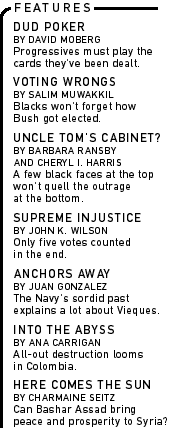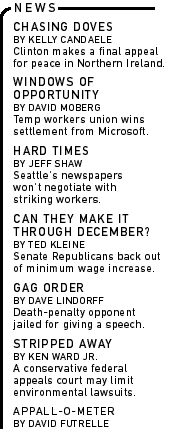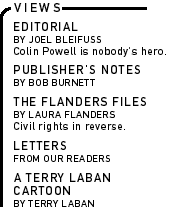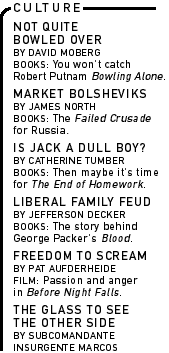 
|

|

|

|
| |
|
|
|
In the near universal acclaim that has smothered George W. Bush's choice for secretary of state of the nation's most famous warrior, Colin Powell, honest appraisal of the man behind the myth has been lost. Powell's journey from Bronx child to Republican wunderkind affirms the American dream. And lest that dream lose its sheen, we had best gloss over certain facets of his career. The unvarnished history of Colin Powell can be found on the Web site www.consortiumnews.com, where Robert Parry and Norman Solomon chronicle Powell's ascension through the ranks of the military and foreign policy elite in the Nixon, Reagan and Bush administrations. As secretary of state, it is a good bet that Powell will promote a foreign policy that is foreshadowed by his Vietnam War record, his role in the Iran-contra scandals and his management of the Gulf War. In his 1995 autobiography, My American Journey, Powell describes burning peasants out of their huts in 1963, "starting the blaze with Rooson and Zippo lighters." "Why were we torching homes and destroying crops?" Powell asks rhetorically. "Ho Chi Minh had said the people were like the sea in which his guerrillas swam. We tried to solve the problem by making the whole sea uninhabitable." As a major in the headquarters of the Americal division in 1968, Powell whitewashed allegations that American soldiers committed atrocities against Vietnamese civilians. Tom Glen, a member of an Americal mortar platoon, had written a letter to Gen. Creighton Abrahms, head of the U.S. Vietnam operations, alleging that soldiers in the Americal division "for mere pleasure, fire indiscriminately into Vietnamese homes and without provocation or justification shoot at the people themselves." Powell did not interview Glen. He relied instead on Glen's superior officer who said that Glen had been too far from the action to have any first-hand knowledge. Powell concluded: "In direct refutation of [Glen's] portrayal, is the fact that relations between Americal soldiers and the Vietnamese people are excellent." Powell wrote that on December 13, 1968, seven months after Americal troops slaughtered 347 Vietnamese civilians in the hamlet of My Lai--a crime that the world had yet to hear about. Twenty years later, Powell was again looking the other way, this time as a key player in the Iran-contra scandal. Powell claims to have known nothing of the scheme to send arms to Iran, in exchange for the release of American hostages in Lebanon, and the administration's efforts to covertly fund the contra's war in Nicaragua. However, at the time these illegal deeds were being carried out, Powell served as the right-hand man of Defense Secretary Caspar Weinberger. When questioned by an investigator, Powell repeatedly pleaded faulty memory. At one point he replied: "To my recollection, I don't have a recollection." He testified that he only found out about the shipment of missiles to Iran on January 17, 1986, the day Reagan formally authorized the transfers. Circumstantial evidence refutes this claim. So does Oliver North, who testified that in his 1985 efforts to get U.S. missiles sent to Iran, "my original point of contact was General Colin Powell, who was going directly to his immediate superior, Secretary Weinberger." Vietnam and Iran-contra taught Powell one lesson: Foreign policy objectives are more easily achieved the less the public knows. He applied this knowledge as director of Operation Dessert Storm, which not only routed the Iraqis out of Kuwait, but strategically kept the media, and thus the public, away from the war. In accepting the nomination to be secretary of state (his approval is a mere formality), Powell explained that he would work with U.S. allies to "energize the sanctions regime" against Iraq. "I will make the case in every opportunity I get that we're not doing this to hurt the Iraqi people," he said. "We're doing this to protect the people of the region, the children of the region, who would be the targets of these weapons of mass destruction if we didn't contain them and get rid of them." In other words, as he learned in Vietnam, you burn a village to
save a village. |

